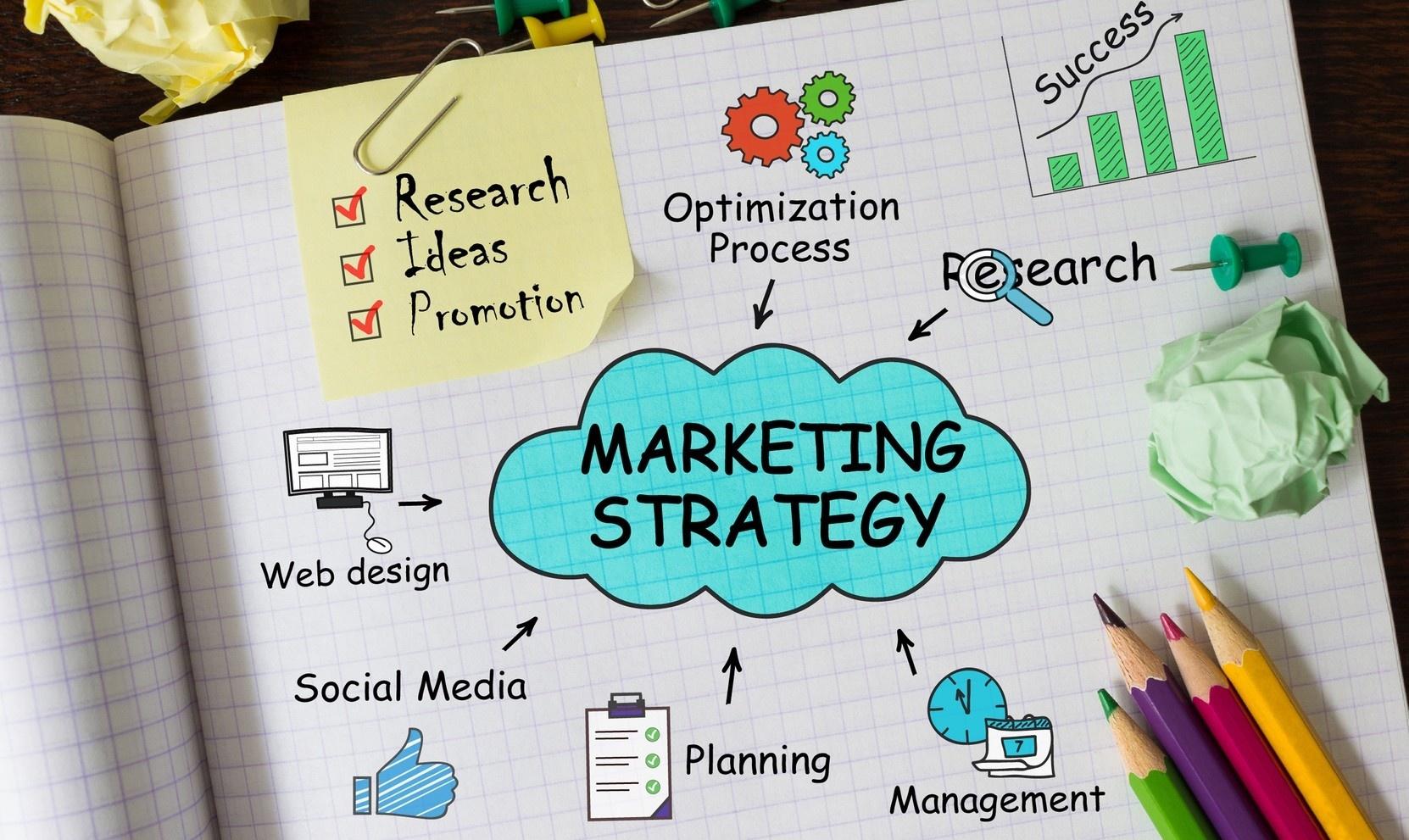BUSINESS
How To Create A Winning Marketing Strategy For A Small Business In Nigeria
Published
2 months agoon

Creating an effective marketing strategy for a small business challenges even experienced entrepreneurs. Most struggle to connect with their target audience despite trying various approaches. We’ll explore proven tactics and real-world examples to help you succeed.
A well-documented marketing strategy for a small business directly impacts your growth potential. However, many owners feel overwhelmed by conflicting advice and endless tactical options. Whether you’re launching a startup or running an established company, you need clear direction.
Top marketing experts have contributed their insights to simplify this process. Instead of presenting an exhaustive list of techniques, we’ve distilled their knowledge into actionable guidance. This focused approach helps you develop a marketing strategy for a small business that actually works.
Our guide cuts through the noise to deliver essential information. We’ll show you how to:
- Identify your most valuable marketing channels
- Create compelling messages that resonate with customers
- Measure results effectively
- Adjust your approach based on data
By following these expert-backed strategies, you’ll build a solid foundation for your marketing efforts and achieve better results.
What is a Marketing Strategy?
A marketing strategy is a comprehensive plan that outlines a company’s approach to reaching potential customers and converting them into loyal repeat buyers.
A well-crafted strategy defines clear goals and objectives, incorporates a unique value proposition, conducts thorough market research, identifies the target market, develops effective messaging, and selects the most suitable marketing channels to engage the audience.
The Four P’s of Marketing:
A successful marketing strategy encompasses the four essential elements known as the Four P’s:
- Price: Determines the cost of products and justifies the pricing strategy.
- Product: Defines the products to be offered and differentiates them from competitors.
- Promotion: Outlines the methods to effectively reach and engage the target audience.
- Place: Specifies the distribution channels where products will be sold.
Benefits of a Marketing Strategy:
- Connect with Your Target Audience: In today’s competitive market, with millions of online stores catering to diverse preferences, a well-defined marketing strategy helps you identify your ideal customers and develop effective ways to reach them.
- Stand Out from the Competition: A strong marketing strategy differentiates your business from competitors and ensures a sustainable competitive advantage. Without a clear plan, you may waste time and resources on ineffective tactics, losing customers to rivals.
- Build a Consistent Brand: A strong brand is essential for commanding premium prices and building customer loyalty. A well-executed marketing strategy helps you establish a recognizable brand identity, connecting with your audience and differentiating your products.
Example: Peloton
Consider the exercise bike brand Peloton. Despite numerous competitors offering similar products at lower prices, Peloton has built a successful brand by focusing on its unique value proposition and target audience.
Through effective marketing, Peloton has positioned itself as the premium choice for fitness enthusiasts, justifying its higher price point and commanding a loyal customer base.
Distinguishing Marketing Strategy from Marketing Plan

A marketing strategy is a comprehensive roadmap for your entire marketing department. It outlines your business’s overarching goals and objectives, as well as the specific channels you’ll employ to reach your target audience and achieve these aspirations. The strategy provides a long-term perspective, guiding your marketing efforts over an extended period.
In contrast, a marketing plan is a more focused document that details the specific tactics and actions you’ll take to execute a particular marketing campaign or initiative. While the marketing strategy provides the overarching direction, the plan outlines the specific steps and resources required to achieve a short-term goal.
Example: Facebook Ads Campaign
If you were to launch a Facebook ads campaign, the marketing strategy would define the overall objective, such as increasing brand awareness or driving sales.
The marketing plan, on the other hand, would outline the specific details of the campaign, including the target audience, ad creatives, budget, and performance metrics.
The plan would explain how this campaign aligns with the broader marketing strategy and contributes to the achievement of the long-term goals.
How to Create an Effective Marketing Strategy for a Small Business
1. Conduct Market Research
To develop a successful marketing strategy, start by understanding your target audience. This involves both qualitative and quantitative research:
- Competitive Analysis: Examine your competitors’ target audience, social media activity, brand voice, and product messaging. Identify their strengths, weaknesses, and opportunities for differentiation.
- Website Analytics: Use tools like Shopify Analytics and Google Analytics to gather demographic data about your website visitors, including age, gender, location, and interests. Analyze their behaviour on your site to understand their preferences and pain points.
- Research Interviews: Conduct in-depth interviews with potential customers to understand their motivations, purchasing habits, and experiences with similar products or services. Ask about their needs, desires, and challenges.
- Surveys: Create surveys to collect quantitative data about your target audience’s demographics, preferences, and opinions. Use tools like SurveyMonkey or Google Forms to distribute and analyze surveys.
- In-Person Interactions: Engage in conversations with potential customers at events like farmers markets, trade shows, or industry conferences. Observe their behaviour and ask open-ended questions to gain insights into their needs and preferences.
- Industry Research: Review research reports from reputable sources like Nielsen, Forrester, or Pew Research to stay updated on consumer behaviour, industry trends, and emerging technologies.
- Purchase Information Analysis: Analyze customer spending data to identify patterns, preferences, and customer lifetime value. Use this information to segment your target audience and tailor your marketing efforts accordingly.
Based on this research, create a buyer persona, a fictional character that represents your ideal customer. This will guide your marketing efforts and help you focus on your target audience.
2. Define Product-Market Fit
Communicate the problem your product solves and why it’s superior to competitors. This involves understanding the “why” behind your products, the problem they address, and your unique selling points. Ask yourself:
- What is the core value proposition of your product or service?
- What problem does it solve for your target audience?
- How does it differentiate itself from competitors?
- What makes it unique and desirable?
By answering these questions, you can develop a compelling message that resonates with your target audience and positions your product as a valuable solution.
3. Set Measurable Marketing Goals
Establish specific, measurable, achievable, relevant, and time-bound (SMART) goals for your marketing efforts. This will help you stay focused, track your progress, and measure the effectiveness of your campaigns. Consider goals such as:
- Increasing website traffic
- Generating more leads
- Boosting sales
- Improving brand awareness
- Enhancing customer satisfaction
- Expanding market share
4. Explore Marketing Channels
Consider various marketing channels to reach your target audience:
- Social Media: Utilize platforms like TikTok, Instagram, Facebook, LinkedIn, Snapchat, WeChat, and X (formerly Twitter) to create engaging content, build relationships with your audience, and promote your products or services.
- Search Engine Marketing (SEM): Optimize your website for search engines to increase visibility and attract organic traffic. Use paid advertising platforms like Google Ads to reach your target audience through targeted search ads.
- Email Marketing: Build an email list and send targeted campaigns to nurture relationships with customers, promote new products, and drive sales.
- Content Marketing: Create valuable and informative content, such as blog posts, articles, videos, or infographics, to attract and engage your target audience.
- Public Relations (PR): Seek media coverage and build relationships with journalists to increase brand visibility and credibility.
- Events and Networking: Participate in industry events, conferences, and networking opportunities to connect with potential customers and partners.
5. Focus on Retention Marketing
Retaining existing customers is often more cost-effective than acquiring new ones. Implement strategies like:
- Loyalty programs: Reward repeat customers with discounts, points, or exclusive offers.
- Personalized marketing: Tailor your messaging and offers to individual customer preferences and purchase history.
- Exceptional customer service: Provide excellent customer support to build trust and loyalty.
- Community engagement: Foster a sense of community and belonging among your customers.
6. Set Your Marketing Budget
Allocate a specific budget for your marketing initiatives. Consider factors such as your business size, industry, and marketing goals. Be sure to allocate funds to each marketing channel based on your priorities and expected return on investment.
7. Measure and Fine-Tune
Track your marketing performance using analytics tools to measure key metrics like conversion rates, customer acquisition costs, and user behaviour. Use this data to identify successful campaigns, areas for improvement, and areas to allocate more resources.
By following these steps and continuously monitoring and adjusting your marketing strategy, you can effectively reach your target audience, drive sales, and achieve your business goals.
Improving Your Marketing Strategy
E-commerce marketing is a complex and challenging endeavour. It often requires experimentation and iteration to find the most effective strategies. If you’re struggling to achieve your marketing goals, consider revisiting your core audience.
Reconnecting with Early Adopters
Reach out to the first customers who believed in your business and invested in your products. Engage in conversations to understand their motivations, preferences, and evolving needs. Their insights can provide valuable guidance for refining your marketing efforts and better serving your audience.
What are the 4 Ps of marketing strategy?
The four Ps (product, price, place, and promotion) are essential components of a marketing strategy. They help marketers determine how to promote their products, reach their target audience, and increase sales.
Why is a marketing strategy important?
A well-defined marketing strategy helps you identify your target audience, develop effective campaigns, and avoid wasting resources on ineffective tactics.
By focusing on strategies that truly resonate with your customers, you can convert strangers into paying customers and achieve your business goals.
What are the 3 Cs of marketing?

The three Cs (company, customer, and competition) provide a framework for understanding your business, your target market, and your competitive landscape.
By analyzing these factors, you can develop a marketing strategy that effectively connects with your audience, differentiates your brand, and builds customer loyalty.
What are the latest marketing strategies?
- Social Media Marketing: Utilize platforms like TikTok, Instagram, Facebook, LinkedIn, Snapchat, WeChat, and X (formerly Twitter) to engage with your audience, promote your products, and build brand awareness.
- Influencer Marketing: Partner with influencers who align with your brand to reach a wider audience and build credibility.
- Affiliate Marketing: Collaborate with affiliates to promote your products or services in exchange for a commission.
- Advertising: Utilize various advertising channels, such as Google Ads, Facebook Ads, billboards, radio, and TV commercials, to reach your target audience.
- Referral and Loyalty Programs: Encourage customer referrals and reward repeat purchases through loyalty programs.
- Search Engine Optimization (SEO): Optimize your website for search engines to improve visibility and attract organic traffic.
- Email Marketing: Build an email list and send targeted campaigns to nurture relationships with customers and drive sales.
- Podcasts: Create or sponsor podcasts to reach a specific audience and position yourself as an industry expert.
- Content Marketing: Produce valuable and informative content, such as blog posts, articles, videos, or infographics, to attract and engage your target audience.
- Digital PR: Leverage public relations strategies to generate media coverage and build brand visibility.
If you would like to read more business articles, visit here.
You may like
-


5 Myths About The Job Market And Their Solutions
-


Master The Art Of Budgeting In Business With These 5 Tips
-


Top 7 Hidden Business Opportunities In Nigeria
-


6 Things To Consider Before Starting A Business In Nigeria
-


7 Most Profitable Business Ideas In Nigeria
-


Telecom Entrepreneurs Raise Concerns Over Borrow-Me-Credit Scheme

Myths about the job market can mislead job seekers and professionals navigating career transitions. Many individuals fall prey to outdated beliefs that no longer reflect the dynamic employment landscape.
Myths about the job market often include misconceptions about required qualifications, salary expectations, and career progression.
One prevalent myth suggests that a traditional four-year degree guarantees immediate employment when in reality, skills, adaptability, and networking play crucial roles.
Another widespread misconception is that changing careers is impossible after a certain age, which undermines the potential of experienced professionals seeking transformation.
Myths about the job market also perpetuate the idea that stability means staying in one role for decades. Modern career paths are increasingly non-linear, with professionals expecting to change jobs multiple times.
The solution lies in continuous learning, developing transferable skills, embracing technological advancements, and maintaining a flexible, growth-orientated mindset.
Myths about the job market can be debunked through proactive research, upskilling, and understanding emerging industry trends.
Let’s take a quick look at these myths and how to solve them below.
Myth 1: You Need a Four-Year Degree to Succeed
While a college degree can open doors, it’s not the only path to a fulfilling career. Many successful professionals have built thriving careers without a traditional degree.
Solution:
- Skill-Based Learning: Focus on developing in-demand skills through online courses, boot camps, or certifications.
- Networking: Build relationships with professionals in your desired field, regardless of their educational background.
- Freelancing and Gig Work: Gain experience and build a portfolio through freelance projects.
Myth 2: The Job Market is Saturated
It’s true that competition can be fierce, but there are still plenty of opportunities for skilled individuals. The key is to identify niche markets and unique value propositions.
Solution:
- Niche Down: Specialise in a specific area within your industry to stand out from the crowd.
- Continuous Learning: Stay updated on industry trends and emerging technologies to remain competitive.
- Personal Branding: Build a strong personal brand to attract potential employers and clients.
Myth 3: You Should Only Apply to Job Postings
While applying to job postings is a traditional approach, it’s not the only way to land a job. Proactive job hunting can yield better results.
Solution:
- Networking: Connect with people in your industry and let them know you’re looking for opportunities.
- Informational Interviews: Schedule informational interviews to learn about potential job openings and company culture.
- Cold Emailing: Reach out to hiring managers directly to express your interest in a position.
Myth 4: You Should Stay in a Job You Hate
Staying in a job you despise can negatively impact your mental health and career progression. It’s essential to prioritise your well-being and seek new opportunities.
Solution:
- Set Career Goals: Define your long-term career aspirations and create a plan to achieve them.
- Upskill and Reskill: Invest in your professional development to enhance your job prospects.
- Network Strategically: Build relationships with people who can help you find new opportunities.
Myth 5: The Job Market is Only for Young People
Age discrimination is a real issue, but it doesn’t mean older workers can’t find fulfilling careers. Experience and wisdom are valuable assets in the job market.
Solution:
- Highlight Your Experience: Emphasise your skills and accomplishments, focusing on how they can benefit your potential employer.
- Adapt to Change: Stay updated on technological advancements and industry trends.
- Mentor Younger Professionals: Sharing your knowledge and experience can boost your credibility and open doors to new opportunities.
Remember, the job market is constantly evolving. By debunking these myths and taking proactive steps, you can increase your chances of finding a fulfilling career.
So, don’t let these misconceptions hold you back. Keep learning, keep networking, and keep believing in yourself.
Key takeaways:
- Myths about the job market can hinder your job search.
- A four-year degree is not always necessary to succeed.
- Skill-based learning and networking can help you land a job.
- The job market is not saturated, but you need to niche down and continuously learn.
- Applying to job postings is not the only way to find a job.
- You should not stay in a job you hate.
- The job market is not only for young people.
- Older workers can still find fulfilling careers by highlighting their experience and adapting to change.
By understanding these myths and implementing the suggested solutions, you can empower yourself to navigate the job market with confidence and achieve your career goals.
Check out more updates here.
BUSINESS
Master The Art Of Budgeting In Business With These 5 Tips
Published
3 weeks agoon
December 2, 2024
Effective budgeting in business is crucial for success. It ensures financial stability and drives strategic growth. Whether you’re a small startup or an established company, proper budgeting in business helps control costs and maximize profits.
Here are five essential tips to master the art of budgeting in business.
1. Set Clear Financial Goals
Every successful budget starts with clear goals. Define what you want to achieve financially. Are you aiming to reduce costs, increase revenue, or expand operations?
Set specific, measurable, and realistic targets. This step provides direction and helps prioritize spending.
Align goals with strategy:
Ensure your financial goals align with your overall business strategy. For instance, if growth is a priority, allocate more resources to marketing and product development.
Budgeting in business becomes more effective when tied to clear objectives.
2. Track and Analyse Expenses
Understanding where your money goes is vital. Track all expenses, no matter how small. Categorise them into fixed (rent, salaries) and variable (utilities, supplies) costs.
Use accounting software to automate this process and reduce human error.
Review regularly:
Analyse your spending patterns monthly or quarterly. Identify areas where you can cut costs or optimise spending. Regular expense tracking ensures your budgeting in business stays accurate and adaptable.
Pro Tip:
Use historical data to forecast future expenses. This helps you prepare for seasonal fluctuations or unexpected costs. Knowing your spending trends enhances control over your finances.
3. Create a Realistic Cash Flow Forecast
Cash flow is the lifeblood of any business. A realistic forecast shows when money will enter and leave your business.
Include all income sources and expected expenses. This prediction helps you anticipate shortfalls and plan accordingly.
Why it matters:
A solid cash flow forecast prevents financial surprises. It ensures you have enough liquidity to cover day-to-day operations. Effective budgeting in business relies heavily on accurate cash flow management.
Example:
If you know a major expense is coming in a particular month, you can adjust spending in other areas. This proactive approach avoids cash shortages and keeps operations smooth.
4. Prioritise Essential Spending
Not all expenses are created equal. Identify which costs are essential for business operations and which are not.
Focus on spending that drives growth or maintains critical functions. Cut or postpone non-essential expenses during tight periods.
Evaluate ROI:
Assess the return on investment (ROI) for each expense. Prioritise high-ROI activities like marketing campaigns that generate leads or equipment upgrades that boost efficiency.
Budgeting in business becomes more impactful when resources are allocated wisely.
Key Areas to Prioritise:
- Payroll and essential staffing
- Marketing efforts with proven results
- Product development
- Maintenance of critical infrastructure
5. Monitor and Adjust Your Budget Regularly
A budget isn’t static; it’s a dynamic tool. Regular monitoring and adjustments are crucial. Compare actual performance against your budgeted figures.
Identify discrepancies and adjust as needed. This flexibility helps you respond to unexpected challenges or opportunities.
Stay proactive:
Review your budget monthly. If you’re consistently overspending in a certain area, investigate why. Maybe costs have increased, or perhaps there’s inefficiency.
Adjust your budget to reflect these changes. Continuous monitoring makes budgeting in business more resilient and accurate.
Use technology:
Leverage budgeting software to streamline this process. Many tools provide real-time updates and automated reports. This technology helps you make data-driven decisions quickly.
The Importance of Budgeting in Business
Effective budgeting ensures you allocate resources efficiently. It minimises financial risks and maximises profitability. Without a budget, businesses can easily overspend or miss opportunities.
Proper budgeting in business helps set clear financial priorities and keeps operations running smoothly.
Key Benefits:
- Financial Control: Keeps track of income and expenses.
- Strategic Planning: Aligns spending with business goals.
- Risk Management: Prepares for unexpected challenges.
- Performance Measurement: Helps assess financial health and progress.
Common Budgeting Mistakes to Avoid
Mastering budgeting requires avoiding common pitfalls. Here are a few mistakes to watch out for:
- Underestimating Costs: Always factor in potential price increases or hidden fees.
- Ignoring Cash Flow: Profit isn’t the same as cash flow. Ensure you have enough liquid assets.
- Overestimating Revenue: Be conservative with income forecasts. Unrealistic expectations can lead to shortfalls.
- Failing to Involve Teams: Include department heads in the budgeting process. They offer valuable insights and ensure buy-in.
Avoiding these mistakes strengthens your approach to budgeting in business and improves financial outcomes.
Implementing Budgeting Tools
Technology simplifies the budgeting process. Numerous tools help businesses create, track, and adjust budgets. Look for software that integrates with your accounting system. This integration saves time and ensures accuracy.
Top Features to Look For:
- Real-time expense tracking
- Customisable reports
- Forecasting capabilities
- Multi-user access for collaboration
Implementing these tools streamlines your budgeting in business and enhances decision-making.
Conclusion:
Mastering the art of budgeting in business isn’t just about numbers. It’s about setting clear goals, tracking expenses, forecasting cash flow, and continuously adjusting.
These five tips will help you build a strong, flexible budget that drives success. Stay proactive, use technology, and prioritize essential spending.
With effective budgeting, your business will thrive financially and strategically.
If you found this article helpful, consider reading more here.

The economy in Nigeria presents abundant hidden business opportunities for savvy entrepreneurs. Business leaders can build sustainable ventures that generate significant profits by exploring these emerging sectors.
From renewable energy to agribusiness, various business opportunities in Nigeria await those willing to innovate. Entrepreneurs who invest in niche markets, such as waste management or digital services, can tap into unmet needs and create impactful solutions.
Understanding local challenges helps identify business opportunities in Nigeria that address critical issues like energy shortages and waste disposal.
For instance, affordable solar energy solutions can offer substantial returns while improving lives. Similarly, the growing demand for e-commerce and logistics presents fertile ground for digital entrepreneurs.
Strategic investments in the right sectors not only maximize profitability but also drive social and economic growth. By capitalizing on these hidden gems, entrepreneurs can turn potential into success stories.
Exploring and seizing business opportunities in Nigeria today ensures a strong foothold in tomorrow’s competitive market.
1. Renewable Energy Solutions
Nigeria faces frequent power outages, creating a demand for alternative energy sources. Investing in solar and wind energy solutions for homes and businesses presents a profitable opportunity.
Entrepreneurs can offer affordable solar panel installation, maintenance services, and off-grid power solutions. The sector benefits from government incentives and a growing push towards renewable energy adoption.
2. Waste Management and Recycling
With Nigeria’s rapid urbanization, waste management remains a significant challenge. Recycling businesses focused on plastics, paper, and metals can transform waste into valuable products.
Opportunities also exist in e-waste recycling and organic composting. Innovative waste collection and sorting services can address the country’s environmental needs while generating income.
3. Agribusiness Ventures
Nigeria’s agriculture sector offers diverse opportunities, from crop and livestock farming to food processing. High-demand crops like cassava, rice, and maize present profitable ventures.
Poultry and fish farming also show significant potential. Processing agricultural products, such as turning cassava into flour or palm oil into packaged goods, adds value and opens export opportunities.
4. E-commerce and Digital Services
Online shopping is booming in Nigeria, particularly in urban areas. Entrepreneurs can tap into niche markets like fashion, electronics, and groceries through specialized e-commerce platforms.
Logistics services, mobile payment integration, and customer education initiatives further enhance this sector. Digital marketing and affiliate marketing also offer lucrative avenues.
5. Health and Wellness Industry
The growing health-conscious population creates demand for fitness centres, organic foods, and wellness services. Establishing gyms, offering personalized training, and selling natural supplements can be highly profitable.
There is also a rising interest in alternative medicine and skincare products based on natural ingredients.
6. Real Estate Development
Nigeria’s real estate market thrives due to rapid urbanization. Affordable housing projects, commercial spaces, and hospitality services are in high demand.
Entrepreneurs can focus on developing residential properties or managing commercial facilities. Property management services for landlords and tenants are also valuable.
7. Educational and Skill Development Services
With a growing youth population, educational services are crucial. Opportunities exist in vocational training, online learning platforms, and tutoring services.
Training programs for high-demand skills like coding, digital marketing, and entrepreneurship can address skill gaps and attract a broad customer base.
These hidden opportunities offer promising avenues for entrepreneurs in Nigeria. By addressing existing challenges and leveraging emerging trends, businesses can thrive in this dynamic market.
Check out more articles on business here.
Latest


OdumoduBlvck Recounts How Don Jazzy Gifted Him $10,000
OdumoduBlvck recently praised Mavin Records founder Don Jazzy in an interview with Beats FM. The rapper discussed his latest project,...


Actress Eucharia Anunobi Preaches Against Seeking Validation From Others
Nigerian actress and evangelist Eucharia Anunobi shared a compelling message about self-empowerment through her Instagram platform on December 19, 2024....


Cleveland Cavaliers’ Forward Isaac Okoro Out For Two Weeks With Shoulder Injury
The Cleveland Cavaliers will be without forward Isaac Okoro for at least two weeks after he sustained a shoulder injury...


Tems Debut Album Ranks #2 On Billboard’s R&B List Of 2024
Tems’ Global Impact: A Billboard Recognition Tems, a global music sensation, has solidified her position as one of Africa’s most...


Adekunle Gold Reveals The Role Pheelz Played In Getting Him Signed To YBNL
Adekunle Gold marks a significant milestone this December 2024 as he celebrates 10 years since releasing his breakthrough single ‘Sade.’...


Africa’s Best Player Ademola Lookman Credits Atalanta for His Rise to African Football’s Pinnacle
Ademola Lookman, the reigning African Player of the Year, has acknowledged the significant role that Serie A club Atalanta has...


Beyoncé Achieves Historic Milestone As Most Certified Female Artist
Renowned singer Beyoncé has solidified her position as the most certified female artist of all time, a distinction bestowed upon...


Everton Confirm Majority Takeover By Friedkin Group To End Moshiri Tenure
The Friedkin Group has acquired a 94.1% stake in Everton, becoming the Premier League club’s new majority owner. The American...


Elozonam Reflects On How “Japa” Makes It Hard For Him To Make Friends
Former BBNaija star and content creator Elozonam revealed how Nigeria’s “japa” syndrome—where individuals emigrate in search of better opportunities abroad—has...


Netflix Struggles In Nigeria With Only About 300k Subscribers – Comedian AY
Comedian and filmmaker AY Makun has weighed in on the controversy surrounding the alleged decision by Netflix to pause funding...
-Ad-




“Gladiator II” Records ₦99.1 Million In Its Opening Weekend At The Nigerian Box Office

“Everybody Loves Jenifa” Can Beat ₦5 Billion – Funke Akindele

You Can Make Your Kunu Drink With This Simple Recipe

“Family Gbese” Earns ₦28 Million In Box Office 2 Weeks After Its Release

Skepta Graced Africa International Film Festival (AFRIFF) In Elegant Trad

“A Ghetto Love Story” Rakes Over ₦22 Million At Box Office In Its Opening Weekend

Wizkid Releases His Highly Anticipated Album, “Morayo”

5 Fashion Mistakes Men Make That Women Find Unattractive

Here’s The Best Recipe For Making Rice Fritters

Denzel Washington Opens Up About 15-Year Battle With Alcohol
Trending
-

 MUSIC5 days ago
MUSIC5 days agoHere Are The Most Streamed Gospel Artists On Spotify Africa
-

 NEWS5 days ago
NEWS5 days agoNNPC Slashes Petrol Prices Nationwide
-

 FAB FRESH4 days ago
FAB FRESH4 days agoBurna Boy Set To Release New Single, “Bundle” This December
-

 ENTERTAINMENT5 days ago
ENTERTAINMENT5 days agoI Was Nigeria’s Sweetheart Until I Got Divorced – Tiwa Savage
-

 BEAUTY5 days ago
BEAUTY5 days agoNigerian Model, Samuel Nwajagu Becomes First African To Win Mister International Title
-

 LIFESTYLE4 days ago
LIFESTYLE4 days ago7 Facts About Samuel Nwajagu, Mister International 2024
-

 ENTERTAINMENT4 days ago
ENTERTAINMENT4 days agoFunke Akindele’s “Everybody Loves Jenifa” Breaks Box-Office Records With ₦206 Million In Its Opening Weekend
-

 FAB FRESH4 days ago
FAB FRESH4 days agoTimaya Releases Music Video For New Single, “Mase”


